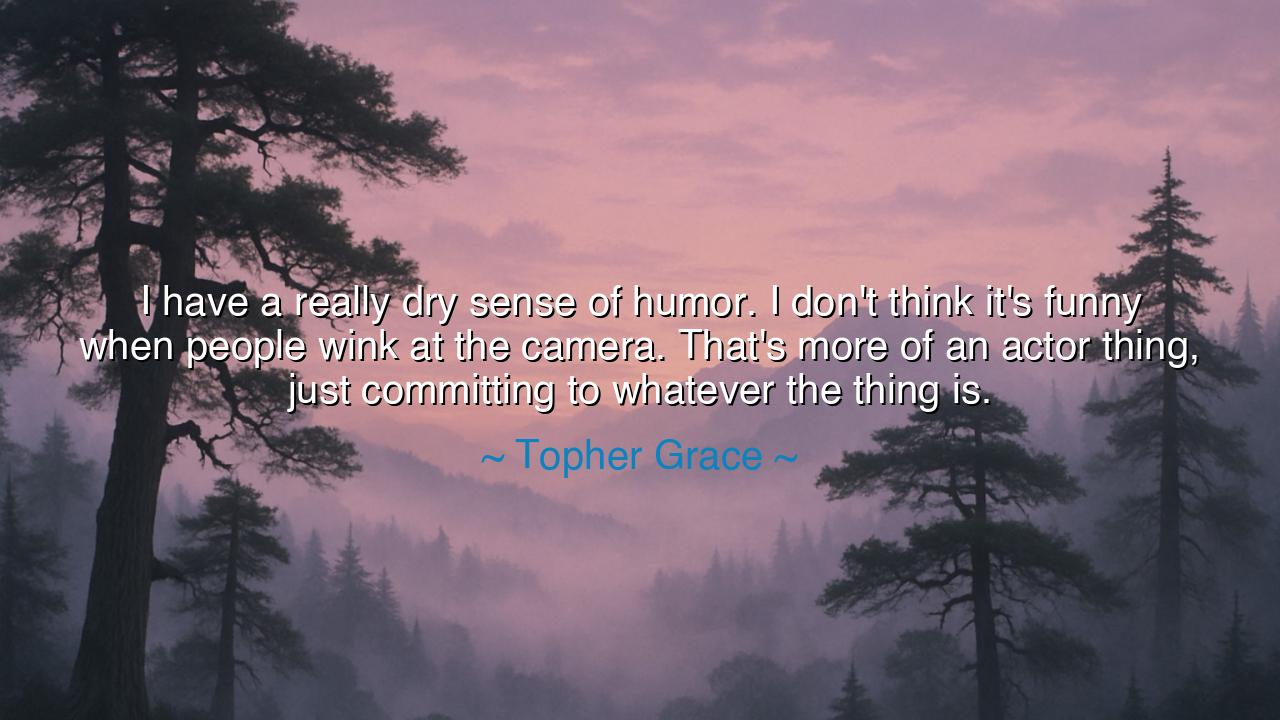
I have a really dry sense of humor. I don't think it's funny when
I have a really dry sense of humor. I don't think it's funny when people wink at the camera. That's more of an actor thing, just committing to whatever the thing is.






Hear, O children of craft and truth, the words of Topher Grace, who spoke not only as an actor, but as a philosopher of authenticity. He said: “I have a really dry sense of humor. I don’t think it’s funny when people wink at the camera. That’s more of an actor thing, just committing to whatever the thing is.” Though his words seem simple, they hold a quiet wisdom, a message for all who strive to create, to lead, or to live honestly in their purpose. In this reflection lies the ancient struggle between authenticity and artifice, between doing for show and doing for truth.
When he speaks of dry humor, he speaks of subtlety—of a wit that does not demand applause, but trusts the discerning heart to understand. Dry humor, like fine wine or gentle rain, refreshes the mind without spectacle. It lives not in exaggeration, but in truth. To such a soul, the gesture of “winking at the camera”—that self-conscious act of breaking illusion—is false coin. It cheapens the sacred exchange between artist and audience. For when the actor winks, he reminds us that it is all performance; but when he commits, he draws us into the dream until we forget it is one.
This devotion to sincerity is not new. In the days of the ancients, the philosopher Aristotle spoke of mimesis—the imitation of life not as a trick, but as a revelation. The artist’s duty, he said, is not to mock life, but to reveal its essence. When an actor “commits to the thing,” as Topher Grace says, he fulfills this ancient calling. He does not perform to be admired; he performs to uncover truth. He becomes, for a brief moment, the vessel through which reality itself speaks. Thus, the act of commitment, though small in gesture, becomes a form of honor.
Consider the example of Charlie Chaplin, the silent wanderer who could make the world laugh without saying a word. Never once did he wink at the camera; never did he break the illusion of the tramp’s world. His commitment was complete. Through his sincerity, we saw both humor and heartbreak—the comedy of human folly and the dignity of the downtrodden. It was this devotion to truth, even in laughter, that made his art immortal. So too does Topher’s wisdom call us to remember: the finest humor springs not from mockery, but from empathy; not from self-display, but from understanding.
In this, there lies also a teaching for life itself. For many live as if before a camera—winking, performing, curating the image they wish to project. But the soul grows weary of pretending. The one who commits, who gives himself wholly to his duty or his dream, finds peace that performance can never offer. When we cease to “wink” at the world—to signal that we are not fully serious—we begin to live with purpose. The true path of the artist, and indeed of the human being, is not to perform for the gaze of others, but to inhabit our calling with sincerity and grace.
There is a subtle courage in what Topher Grace describes: the courage to believe that truth is enough. In an age that rewards spectacle, dry humor—measured, understated, real—is an act of rebellion. It says, “I will not force laughter; I will earn it.” It trusts the intelligence of the listener, the strength of the story, the honesty of the moment. And this, in turn, is the mark of mastery. To commit to your craft, your relationships, your beliefs, without the need for external approval, is to walk the timeless path of the wise.
Therefore, let us learn from this teaching: commit to the thing. Whatever your work, your art, or your love may be, enter it fully. Do not wink at the camera of life, pretending you do not care. Do not dilute your truth for the sake of charm. Be present. Be sincere. For the world already has enough actors—it needs more believers. When you work, work wholly. When you laugh, let it be true. When you create, let it come from the soul’s quiet conviction, not the ego’s performance.
In this way, you will become, as Topher Grace describes, a master of your own craft and a mirror of truth. The humor that springs from honesty will outlast every jest; the art that comes from integrity will never fade. Commitment is the purest comedy, the truest art, and the highest form of love.






AAdministratorAdministrator
Welcome, honored guests. Please leave a comment, we will respond soon